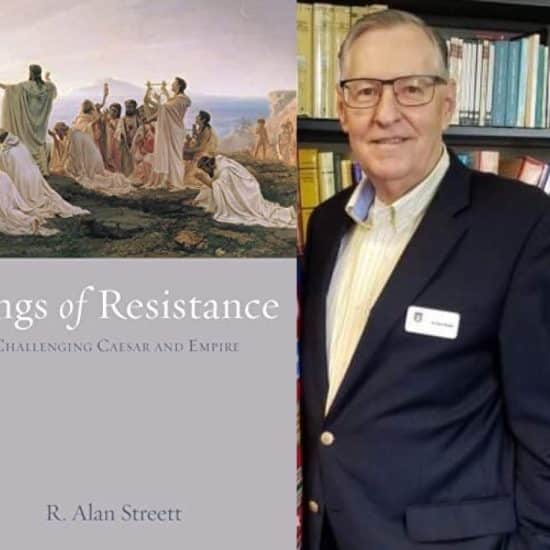Since the earliest days of Christianity, followers of Jesus have wrestled with the demands of dual citizenship — as citizens of God's kingdom and of the nations of this world.
Jesus established the principle: "Give to Caesar what is Caesar's and to God what is God's." But some American Christians, in particular, struggle with how to put the principle into practice.
 |
About 10 years ago, theologian Marcus Borg said, "I'm convinced that for many Americans, their political loyalties run deeper than their religious loyalties."
Jim Denison, theologian-in-residence with the Baptist General Convention of Texas, agrees with Borg's assessment.
"For many Americans, politics are more relevant, personal and passionate than religious loyalties," said Denison, president of the Denison Forum on Truth and Culture.
Consequently, a significant number of Christians in the United States give greater allegiance to their nation than to the kingdom of God, Baylor University professor Greg Garrett asserts.
"Too many American Christians identify themselves first as Americans — self-reliant, hard-working individuals who aspire to a secular version of happiness that comes through acquisition and possession — rather than as Christians — other-directed, hard-working members of something larger than themselves who seek the joy and peace that comes from faithful service and love" Garrett writes in Faithful Citizenship: Christianity and Politics in the 21st Century.
Christian citizens need to distinguish that which is good — American virtues such as hard work and personal responsibility — from the highest good — love for God and one's neighbor, Garrett insists.
"If we ask of our politicians and of ourselves what Jesus taught as our highest good—the love of God and of each other—we can most certainly achieve more peace, more justice and more happiness than we see now in a world seeking its own glory, in individuals glorying in their own selves. We can offer a broken world more wholeness, restore more respectful conversation to the political process and model in our entire lives the faith that too often we confine to private devotion," he writes.
"If your highest good is to love and serve God, you will orient your life in that way. But if your highest goal is security — that is, not to be so afraid, and to feel as though you somehow exert some control over a chaotic world — then your orientation will be very different…. When security is our highest good, we tend to live tiny, frightened lives that keep us from loving fully, living generously, extending hospitality to the stranger." American Christians often fail to distinguish deeply held patriotic impulses from religious convictions, Garrett explained in an interview. "It's easy to take the beliefs we hold dear about America alongside our sacred religious beliefs and get them confused," he said.
Ethicist David Gushee agreed, saying: "Some bleed Republican or Democrat more than Christian or Jewish or atheist. But it's even worse when Christians confuse Republican or Democrat with Christian or Jewish or atheist. That probably happens just as often."
Aaron Weaver, a doctoral student at Baylor University who blogs as "The Big Daddy Weave," remains convinced many Americans cannot separate categories of political loyalties and religious loyalties.
"The political and religious have been fused into a hyper-Americanized, hyper-partisan Christianity," said Weaver, a graduate fellow with Baylor's Academy for Teaching and Learning.
Weaver emphasizes the importance of responsible Christian involvement in the political system — which means engagement in political parties. "But this hyper-partisan Christianity that equates being a good Christian with being a member of a certain political party is what happens when party loyalty is put ahead of principles."
So, if Christians need to be involved in the political process but not manipulated into confusing partisanship with discipleship, how can they choose the right candidates who deserve their vote?
"The primary criteria should be relevant experience and performance history, political principles and related moral values, history of building a strong work team, leadership gifts, character qualities, temperament, verbal and personal self-discipline, and performance under pressure," said Gushee, professor of Christian ethics and director of the Center for Theology and Public Life at Mercer University.
Matters of personal faith and doctrinal commitments only matter to the degree that they affect those criteria, he added.
Weaver insisted Christian voters should focus on how candidates' proposed policies align with their own ethical principles and values.
"As a voter, I'm not concerned with Paul Ryan's ecclesiology or Joe Biden's view of baptism. But I am concerned with their respective understandings of social justice and what justice looks like in our pluralistic society," he said.
In evaluating the relative importance of issues and how candidates stand on them, Christians need to weigh several factors, Gushee said.
"I think it is important to consider whether such matters as whether one believes the Bible speaks clearly to an issue, the level of significance given to an issue in Scripture (and perhaps also Christian tradition), whether the matter falls properly under the jurisdiction of the federal government, whether the personal beliefs of the candidate are likely to affect what actually happens in governance, and whether the stated policy goals of the candidate are likely to be effective in accomplishing the principles they say that they stand for," he said.
Garrett approaches the question differently. He noted his position about evaluating candidates has changed over the last couple of years spent writing a blog about faithful citizenship for the website Patheos.com.
"If our political process is broken, I think it's because our decision-making process is broken," he said. "I've come to a point where I care less about a candidate's drop-dead policy positions and more about the candidate's willingness to listen to others."
Likewise, if Christian citizens want to see candidates practice civility, they should get their own houses in order.
Humility should characterize faithful citizenship, he insisted, pointing to a lesson he learned from reading Augustine of Hippo, the 4th century Christian theologian.
“Augustine understood we have imperfect understanding. That means we have to hold out the possibility we might be wrong or have only part of the truth — and the person who holds a different view also may have part of the truth,” he said.
“Rather than reject the other person completely, we should come and reason together.”

